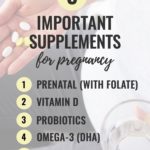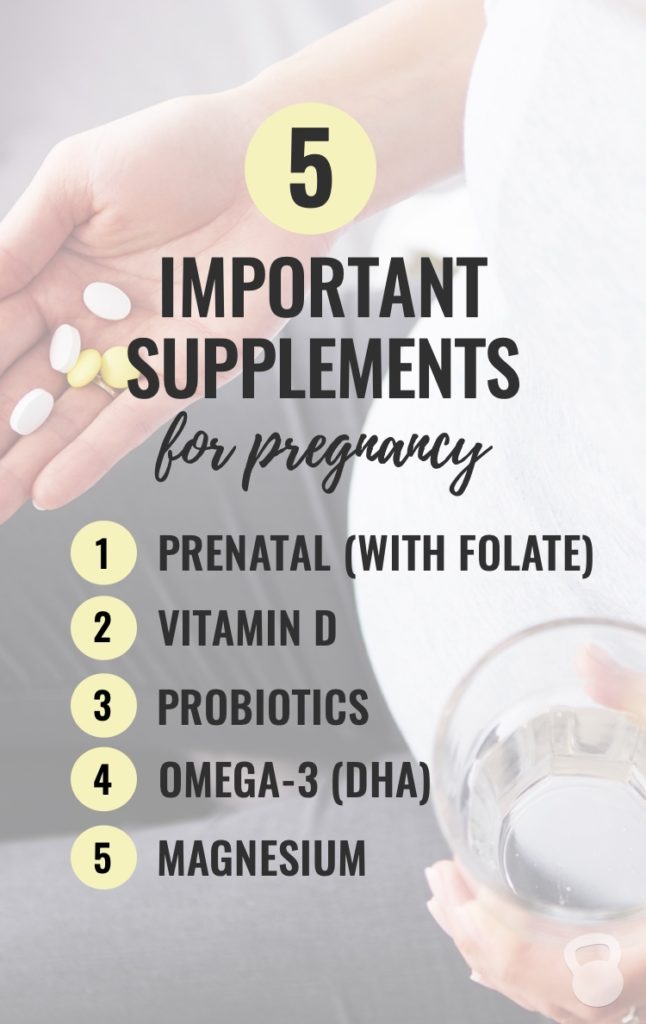Is Beef Liver Safe During Pregnancy


While most people are familiar with the idea of taking a prenatal vitamin, knowing what supplements to take during pregnancy and which pregnancy supplements are best can be incredibly overwhelming. (Not to mention, that whole taking care of a baby thing, right?)
With the rise in direct-to-consumer supplement companies and brands advertising through social media, it's easy to get caught up in the marketing hype of supplements for pregnancy. While your health practitioner may have specific recommendations for you personally, more often than not women are told to "just pick one" when it comes to supplementing during pregnancy without any real guidelines on how to choose.
As a side note, I always recommend discussing any supplements you plan to take with your trusted provider. The recommendations I make below are general advice and may not be specific to your medical conditions or individual needs.
There are two things to keep in mind when it comes to selecting the best pregnancy supplements: 1). Ingredient quality, or what is actually included in the supplement, and 2.) Understanding your individual needs. Don't worry, we'll decode both below.
Already trying to get pregnant? Start supplementing now
If you're planning on trying to conceive soon, take a prenatal with folate (this is the one I highly recommend) 3-6 months prior to attempting to conceive. I emphasize with folate because it is incredibly important to take one with folate, not folic acid (more on that below).
While supplementing with a prenatal vitamin with folate prior to and during pregnancy is critical, your focus should always be on getting the nutrients you need from food first.
Supplements During Pregnancy: Start with Food
The best, most effective way to build up your nutrient stores and support a growing life is with a nutrient-dense diet. When attempting to conceive and during pregnancy, it's incredibly important to focus on:
1. Protein
Protein from high-quality animal foods is rich in heme-iron (easily absorbed in the body), zinc, and B vitamins. These nutrients are some of the most important ones to a growing baby, especially in the first trimester.
Consume nutrient-dense protein such as grass-fed meats and organ meats on a regular basis. Other high-quality sources of protein include pasture-raised eggs and cold-water fish such as wild-caught salmon and sardines, which are rich in long-chain omega-3 fatty acids know as DHA.
Long chain omega-3s are incredibly important for brain development, and have been shown to encourage the genetic expression of iron transport proteins. This means eating wild-caught salmon will ensure your baby is getting both DHA and iron during pregnancy.
2. Leafy greens
Dark leafy greens like spinach, kale, and chard are excellent sources of calcium, iron, and folate. Demand for folate (vitamin B9) increases during pregnancy because it's needed for growth and development of baby's brain in the first trimester.
Build up your stores by eating lots of dark leafy greens prior to and during pregnancy. Add a handful or two to a smoothie, batch of soup, or make a big salad nightly for the nutritious boost.
3. Probiotic foods
Your gut microbiome, which is made up of all of the bacteria in your gut, plays a vital role in managing your immune system, metabolism, and long-term health. So, it's probably not surprising that your gut health directly influences your baby's gut microbiome and overall health.
Keep your immune system healthy by incorporating probiotic-rich foods throughout pregnancy. Foods such as kefir, kombucha, sauerkraut or kimchi will help improve gut health and give you (and your baby's) immune system a powerful boost.
4. Healthy fats
Fats are important for supporting proper brain development and hormone function. Ditch the (inflammatory) vegetable oil and cook with stable fats like coconut oil and olive oil.
As your appetite increases throughout pregnancy, incorporate snacks with high-quality fats such as avocado, an apple with nut butter, or a smoothie made with coconut milk. High-quality protein foods also contain good quality fat, like pasture-raised eggs (eat those yolks!) and wild-caught salmon.
Because many women struggle with maintaining a nutrient dense diet during pregnancy due to morning sickness and nutrient demand soars when creating another human life, taking high-quality pregnancy supplements can give you peace of mind and ensure you and your baby are getting plenty nutrients.
Supplements During Pregnancy: Why Quality Matters
Most supplements and prenatal vitamins available at drug stores contain synthetic nutrients that are isolated, low quality, and poorly absorbed in the body.
Nutrients need co-factors like other vitamins and minerals, enzymes, and phytonutrients to be properly absorbed, and most conventional brands don't take this into consideration. As a result, food-based supplements tend to be more effective because the nutrients are naturally-occurring.
This doesn't mean all food-based supplements are good, or that synthetic vitamins are bad. In fact, some synthetic prenatal vitamins contain highly absorbable forms of nutrients with important co-factors specifically formulated for certain conditions, such as an MTHFR gene mutation. However, with synthetic vitamins, source, processing, and having the proper balance of nutrients is key.
With pregnancy supplements, it's also important to evaluate how the nutrients are processed (high heat, for example, can damage nutrients), and the additives. Avoid products that contain additives like sugar, artificial dyes, unnecessary preservatives, and allergens like wheat, corn, or soy.
With that in mind, here are the five most important supplements for pregnancy that will ensure you and your baby are getting all the nutrients you need.

5 Important Supplements For Pregnancy
1. Prenatal vitamin (with folate)
When it comes to the best prenatal vitamin, it's important to look for one that contains a variety of high-quality nutrients, including folate, vitamin B12, vitamin B6, zinc, and iodine. You may also want to look for one that contains iron and choline depending on your individual needs.
In general, I recommend getting DHA from a separate high-quality fish oil supplement, and boosting your vitamin D3 + K2 with an additional supplement as most prenatal vitamins have minimal amounts (more on that below).
A special note about folate vs folic acid
Whether you go the food-based supplement route or go with a synthetic prenatal, it is critical that you look for one that contains folate,not folic acid. Folate is the natural form of B9 that our bodies can recognize and process. Folic acid, on the other hand, is the oxidized chemical synthetic form that was created in 1943. Folic acid is often used in low-quality dietary supplements and fortified into processed foods.
Unlike folate, folic acid must go through methylation in the liver in order to be used by the body. Many people, including those with an MTHFR gene mutation, have a reduced ability to turn folic acid into folate. This means your body (and your growing baby) won't get enough folate. It also may result in unnatural levels of unmetabolized folic acid in the body, which has been linked to things like the development of cancer.
Of course, folate is crucial to a healthy pregnancy as deficiencies have been linked to miscarriages and birth defects. This is why it's a good idea to boost your folate intake 3-6 months prior to trying to conceive. Take between 800 mcg – 1000 mcg of folate daily.
My best prenatal vitamin recommendations
The whole food prenatal I recommend and take personally is Garden of Life Prenatal Once Daily. I recommend this for women who are eating a nutrient-dense diet as outlined above. It's the perfect insurance policy and an added boost of folate, iron, and B vitamins. PureSynergy PureNatal is a great option, especially since it contains additional vitamin D3 and K2, and choline.
If you have an MTHFR gene mutation or you suspect you are deficient in folate, I recommend the Seeking Health Prenatal. This prenatal is well balanced and contains the most bioavailable, absorbable forms of nutrients, including folate (L-5-MTHF) and B12 (methylcobalamin and adenosylcobalamin). I also recommend Thorne Prenatal if you're in need of more iron.
2. Vitamin D3 + K2
Vitamin D plays an important role in health, especially during pregnancy. It's not only necessary for mineral absorption (hello bone health!), it also helps support and balance the immune system.
During pregnancy, vitamin D has been found to support your baby's brain development and reduce the risk of miscarriages.
While vitamin D is limited in food (egg yolks and liver are the best dietary sources), your body can synthesize vitamin D when exposed to the sun. Unfortunately, because most people spend their time indoors or covered up, especially during the winter months, many people are deficient in vitamin D.
According to the Vitamin D Council, pregnant women should get anywhere from 4000 – 6000 IU a day. Most prenatal vitamins don't contain anywhere close to that.
When looking for a good vitamin D supplement, make sure to take one that contains vitamin D3 (not vitamin D2), which is the form the body produces and recognizes. You'll also want to make sure it contains vitamin K2, which is necessary for vitamin D to be absorbed. I recommend Thorne Research – Vitamin D/K2 Liquid Drops.
3. Probiotics
In addition to consuming probiotic foods, taking a high-quality probiotic supplement will help populate your gut and vaginal tract with beneficial microorganisms. This will boost your immune health and help to develop your baby's gut and immune system during pregnancy, and inoculate your baby's gut during a vaginal delivery.
I recommend taking a general multi-strain probiotic like Bio-Kult. If you've struggled with yeast infections, urinary tract infections, or have tested GBS positive in previous pregnancies, I recommend taking a vaginal probiotic that contains Lactobacillus rhamnosus and Lactobacillus reuteri like Jarrow Formula's FemDophilus.
4. Omega-3s (DHA)
Long-chain omega-3 fatty acids, also known as DHA, are needed for proper brain development for your growing baby. Research shows DHA also plays a role in the genetic expression in iron transport proteins. In other words, DHA directly impacts you and your growing baby's iron levels.
The best source of long-chain omega-3 fatty acids is cold water fish like wild-caught salmon and sardines. DHA can also be found in pasture-raised eggs, and meats and dairy from grass-fed animals. If you're unable to consume high-quality fish twice a week, I recommend supplementing with a high-quality fish oil supplement like Vital Choice Wild Sockeye Salmon Oil.
5. Magnesium
Magnesium is a mineral and an electrolyte. It relaxes your nervous system, which allows your parasympathetic nervous system (responsible for rest and restoration) to carry out normal processes. Magnesium also helps to regulate cortisol levels, allowing for more balanced hormone production.
For your baby, magnesium plays an important role in building strong teeth and bones. Research suggests adequate magnesium during pregnancy can help prevent the uterus from contracting prematurely.
Unfortunately, it is very hard to get adequate magnesium through food due to soil degradation, which means most people are deficient in this important mineral.
During stressful times, you burn through magnesium quickly, and during pregnancy, your demand for magnesium increases. Because pregnancy can be a rather stressful time, supplementing with magnesium is incredibly important for pregnant mamas.
I recommend taking an oral chelated (easy to digest) magnesium supplement like Design for Health Magnesium Chelate. You can also supplement with magnesium transdermally with Ancient Minerals Magnesium Oil. In fact, a lot of mamas (myself included) have found that using Magnesium Oil nightly in the first trimester can help to reduce morning sickness significantly due to its ability to modulate cortisol and regulate blood sugar swings.
Studies show supplementing with at least 300 mg of magnesium is associated with positive outcomes during pregnancy.
Bonus: Nutrient Boosters
Desiccated Liver
Liver from grass-fed animals is rich in many nutrients that are incredibly important for pregnant mamas, including vitamin B12 and other B vitamins, and minerals like iron and zinc. Unfortunately, liver is not loved by many, and consuming it during pregnancy can be a challenge, especially if you're suffering from morning sickness.
If you can't stomach the occasional liver, take a high-quality desiccated liver supplement as an added boost of B vitamins and iron. I recommend Vital Proteins Grass-Fed Desiccated Beef Liver.
Vitamin C
During pregnancy, your immune system is working extra hard to keep you and your baby healthy. Particularly during cold and flu season, adding vitamin C can boost your immune system and help to ward off or reduce the time you're sick.
Foods rich in vitamin C include citrus fruits, bell peppers, broccoli, kiwi, spinach, and tomatoes. If you start to feel sick, take as much as 1000 mg daily of vitamin C, and continue until your symptoms disappear. I recommend PureSynergy Natural Vitamin C Powder or Pills.
Have questions about the supplements for pregnancy I shared above? Post your questions below!
Be strong,

Source: https://coconutsandkettlebells.com/supplements-for-pregnancy/
0 Response to "Is Beef Liver Safe During Pregnancy"
ارسال یک نظر